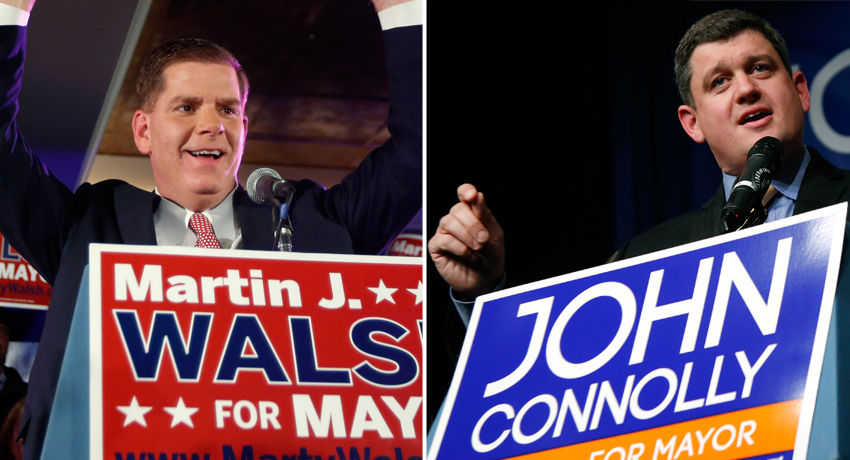The Newish Boston

Photos via AP
Demographics is not destiny. For many in Boston—including Tom Menino, when I asked him the question some years ago—it was something of a matter of faith that Boston’s next mayor would be a minority. Make the most prominent African-American candidate, with stellar credentials, the only woman in the race as well, and the outcome seemed obvious.
Turns out, candidates and campaigns matter. Charlotte Golar Richie, for whatever combination of reasons, was simply not a good candidate. She failed to win over potential funders and endorsers, and ultimately some 86 percent of preliminary voters. If anything, she likely prevented the emergence of the one “New Boston” candidate who did win over nearly everyone he could reach with limited time, resources, and attention: John Barros.
So in the end, 47 percent of Boston voters marked their ballots for a white, Irish man—but not so much as a triumph of Old Boston as a recognition that those were the best candidates to move the city forward, regardless of appearance. First-place finisher Martin Walsh, of Dorchester, and runner-up John Connolly, of West Roxbury, both have one foot in Old Boston to be sure, but in many ways, they are ideologically as New Boston as any of the top candidates in the race. Both have had trouble over the years convincing New Bostonians to see past the exterior; they will now get the opportunity to make the case.
It was interesting, then, to see the stark difference between their election-night events. Connolly, who has made more inroads than Walsh among minorities and younger progressives to date (as preliminary election returns seem to confirm; more on that in a later post), positioned his event as a symbolic first step toward appealing to those voters. The symbolic gesture of spending election night in Roxbury’s Dudley Square will not be lost on minority voters, or the community leaders whose backing he and Walsh will be seeking; the location also assured a diverse crowd, at the expense of the usual exuberance of a candidate’s home-base crowd.
Walsh, by contrast, had as much exuberance as you could ever want. Plunking his election-night party down in Dorchester’s Venezia Restaurant, a couple of miles up the waterfront from his Savin Hill home, Walsh celebrated with the folks who got him into the final: a diehard army of loyal volunteers. Yes, that meant an overwhelmingly white, mostly male, predominantly blue-collar crowd that sends the wrong first signal to New Bostonians. But maintaining and increasing the size and enthusiasm of that cadre is critical to Walsh’s success.
It is also very likely, based on my own interpretations from conversations over time with people in and around the campaigns, that the campaign between the two will now be in a sense a battle to define themselves and each other for the two types of audiences at their respective events last night.
Connolly, I expect, will try to widen his advantage with minorities and young professionals by emphasizing policy and vision to move the city in a more progressive direction; while trying to minimize his disadvantage with white working-class voters by arguing that those changes will benefit everyone.
Walsh, I anticipate, will try to widen his advantage with white working-class voters by emphasizing his background as a son of immigrants who worked his way to make something of himself (in contrast to his privileged-son opponent) while trying to minimize his disadvantage among minorities and young professionals by arguing that his background led him to advocate progressive policy.
There is truth to both versions. I have known both of them for some years now, and while they are both savvy politicians who at times do things for political reasons, I also have found them both to be genuine pragmatic progressives who earnestly believe that they are pursuing agendas that would be best for all the people they represent—and who have both won over support of both Old and New Bostonians whose judgment I respect.
Both have a lot of work to do. They both fell well short of taking 20 percent of the preliminary vote, hardly a soaring mandate; more foreboding, they each earned the vote of roughly 20,000 Bostonians—a fraction of what they’ll need to get a majority of a presumably much larger November turnout.


